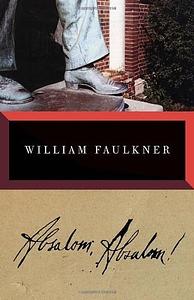Take a photo of a barcode or cover
After I taught a class on Faulkner in the fall, this is the book I most wanted to go back to, thinking I hadn't given it a fair shake the last time I read it. It took me four months to get to it, but when I did, well, I was disappointed. I can see that there's a lot of what feels like technical virtuosity here, with the layered and embedded narratives of Rosa Coldfield, the Compson grandfather. Mr Compson, Quentin and Cleaves. But to me, the style sort of curdles, as it does in a lot of the later Faulkner I've read, where you sort of get this artistry but there's not a whole lot of depth to it, like it really is about disentangling the plot that Faulkner has lovingly tangled for you. There aren't, for me, a lot of memorable phrasings here that I'd want to go back to and puzzle over aside from the way they conceal/ reveal the plot.
And despite what I'd remembered [spoiler alert] it's not Thomas Sutpen who's black. I'd imagined a rewritten version of Chopin's "Desiree's Baby" whereby Sutpen only discovers he's black because he keeps fathering black babies. If you're going to do miscegenation as a theme, and think of the way that would also sweep in the way Sutpen rewrites Gatsby's story, well, to me that's a more interesting book [spoilers end].
There are good things here-- the macabre of the detail of the end of Mr Coldfield's life is the kind of joke Faulkner can still tell well in this book. There's some good stuff about Bon, I thought, and his appearance and place at Oxford. Hell, there's Oxford, and Jefferson, in the same book. and that almost creates a singularity. There's a version of the story of Col Sarty from "Barn Burning," tucked into T Sutpen's past that maybe tells us what becomes of Sarty after his night in the woods (though I don't want to believe it). There's a lot in here-- this is a long book, especially when compared to some of Faulkner's other greatest hits. I recognize that the artistry of it makes it a major achievement. But it's one that doesn't move me, much.
And despite what I'd remembered [spoiler alert] it's not Thomas Sutpen who's black. I'd imagined a rewritten version of Chopin's "Desiree's Baby" whereby Sutpen only discovers he's black because he keeps fathering black babies. If you're going to do miscegenation as a theme, and think of the way that would also sweep in the way Sutpen rewrites Gatsby's story, well, to me that's a more interesting book [spoilers end].
There are good things here-- the macabre of the detail of the end of Mr Coldfield's life is the kind of joke Faulkner can still tell well in this book. There's some good stuff about Bon, I thought, and his appearance and place at Oxford. Hell, there's Oxford, and Jefferson, in the same book. and that almost creates a singularity. There's a version of the story of Col Sarty from "Barn Burning," tucked into T Sutpen's past that maybe tells us what becomes of Sarty after his night in the woods (though I don't want to believe it). There's a lot in here-- this is a long book, especially when compared to some of Faulkner's other greatest hits. I recognize that the artistry of it makes it a major achievement. But it's one that doesn't move me, much.
Faulkner blows me away. He's a challenge to read, to even follow sometimes. And I must keep my dictionary at hand. But what a reward to get through this amazing novel. So many layers, so much missed on a first read, I am inclined to begin again (though I won't... yet).
challenging
dark
mysterious
reflective
tense
slow-paced
Plot or Character Driven:
Character
Strong character development:
No
Loveable characters:
No
Diverse cast of characters:
Yes
Flaws of characters a main focus:
Yes
this book made no sense 90% of the time. That being said, I actually kind of liked it. Read it for the Faulkner portion of my English Class
I adore the structure of this novel. Part gothic horror,
part soap opera, and part experimental fiction.
part soap opera, and part experimental fiction.
I love the way the novel is framed and how we are hearing the story through the family generations, and ultimately through a very troubled young man as he tries to come to terms with his family and communities violent, sexualized history with slavery.
Just re-read this after 25 years. This is still my all time favourite book. There's a moment when you somehow "hear" the voices of the characters. Unbelievably good.
While it might be a classic, from today’s viewpoint the story is deeply problematic.
Great story, but florid, overwrought prose did not work well for audio book. Will try in print to see if any better.





